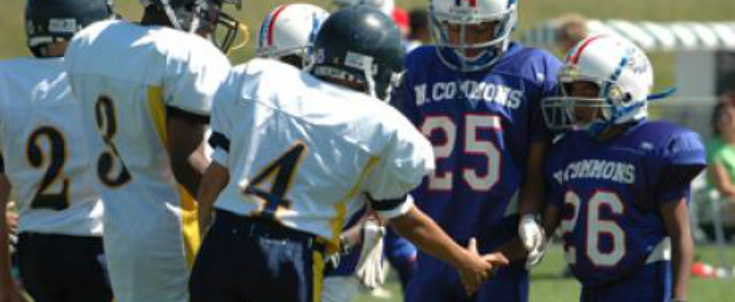Sportsmanship starts with respect for opponent

A strong tackle takes a ball-carrier to the ground hard.
Help your opponent up.
A quarterback gets hit late, drawing a yellow flag and an automatic first down.
Acknowledge the penalty.
A hard-fought game ends following an afternoon of shifting momentum and lead changes.
Line up and shake hands.
Sportsmanship, fair play and respect for your opponent are qualities inherent to the way football is taught at the youngest levels and should not get lost in the desire to win.
Chuck Kyle has led Cleveland St. Ignatius High School to 11 Ohio Division I state championships. He stresses a number of things throughout his program – run hard, block hard, tackle hard and honor your opponent by playing your best.
Do that, and the scoreboard takes care of itself.
“From the earliest stages of the game, the idea of finding a short cut to victory should be eliminated from a young person’s mind,” Kyle said. “Make the hit, help the guy up and get on to the next play.”
Kyle was the head coach of the 2009 U.S. Under-19 National Team that won a gold medal at the IFAF U-19 World Championship. His defensive coordinator at that event, Cincinnati St. Xavier head coach Steve Specht, also is the 2012 U.S. Under-19 head coach.
Specht said football is a collision sport, with players going fast and furious all over the field. He encourages aggression in his players but always with respect for the other team.
“I want our players to play to the best of their abilities within the rules of the game,” said Specht, who has led St. Xavier to two Ohio Division I state titles. “If they do that, they are successful regardless of the score.
“Sportsmanship comes directly from the school of ‘everything I need to succeed in life I learned in kindergarten.’ We were all taught to play nice when we were 4 years old, and that really hasn’t changed.”
That is the approach Steve Cooke is taking at the Greenville County (S.C.) AYF, an organization of 83 teams and more than 2,300 players.
As league commissioner and sports manager for the county, Cooke rewards sportsmanship with free pizzas and admission to area water parks.
Cooke said one player was singled out at the end of a recent season for always helping his opponents up and patting them on the back. Bigger and stronger than most of the other players in the league, the young athlete encouraged his teammates and opponents through action and example to the point where adults took notice.
“I want parents and coaches to let us know when they see kids doing good things,” Cooke said. “It’s not all about winning. It’s about how you present yourself on the field.”
Cooke’s league gives out helmet decals for good plays, but they can only be awarded by the opposing coach. That way, important contributions are recognized, not “big hits.”
“It’s about rewarding positive behavior,” Cooke said.
Neither Kyle, Specht nor former Northwest Missouri State head coach Mel Tjeerdsma use helmet stickers for their team.
Tjeerdsma led Northwest Missouri State to three NCAA Division II national championships before leading the 2011 U.S. Men’s National Team to a gold medal in the IFAF Senior World Championship.
Tjeerdsma said amateur athletes don’t need incentives to play hard and college coaches who project pride in their schools and their programs have that reflected in their athletes’ play.
Most coaches and many players know each other off the field, so respect for your opponent should be a natural result. It shows both during competition and after the whistle.
“We took pride in how we represented Northwest Missouri and Division II,” Tjeerdsma said. “Dirty play and things like that were never part of our coaching. There were personal fouls and things like that happened through the natural course of the game, but we did not accept any type of unfair play.”
If a player drew a personal foul as the result of a bang-bang play, all he usually got was a word or two from the coaching staff, Tjeerdsma said. If a hit came well after the whistle or put someone in danger, that player could expect to spend time on the bench.
Kyle has a simple approach to players he believes cross the line between aggressive and reckless – a spot on the sideline next to him.
“If you tackle someone as hard as you can and in good form, the other coaches and players respect that and will let you know,” Kyle said. “If you get out of control, you are coming out of the game.”
In the end, it’s the coaches’ responsibility to set the tone for his or her team. Players who are rewarded for good, clean plays will continue to produce them. By contrast, coaches who encourage “bending the rules” will get players who put themselves and their opponents in danger.
“Coaches have an enormous responsibility to teach their players using sound principles of character and sportsmanship,” USA Football Director of Football Development Nick Inzerello said. “These need to be two core elements of any coach’s philosophy and approach to providing a positive learning experience for their players.
“As the coach, your players will follow your leadership. Their behavior is a reflection of you. Leading by positive example is paramount in coaching.”
